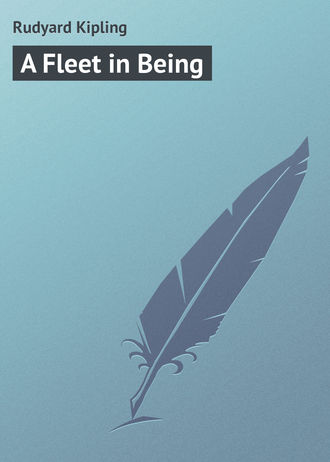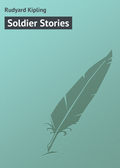
Редьярд Джозеф Киплинг
A Fleet in Being
CHAPTER IV
It was the Captain’s coxswain (see Note II.) – precise, immaculate, and adequate as ever – who met the returning guest at Devonport a year later – September, 1898. This time my cruiser was not with the Fleet, but on urgent private affairs. A misguided collier had seen fit to sit on her ram for a minute or so in Milford Haven, a few days before, and had twisted it thirteen inches to starboard. The collier was beached as soon as possible, and the Admiral he said to us (this I got from the coxswain as we drove to North Corner, by night, through blue-jacketed Devonport): ‘Can you go round to Plymouth with your nose in that state?’ ‘Lord love you, yes,’ said we, or words to that effect. ‘Very good,’ said the Admiral, ‘then you go.’ This we did at an average speed of sixteen knots, through a head-sea, with a collision-mat over our nose (‘Same mat we used when we tied up the Thrasher, sir’), and we ran her up to eighteen point two for a few hours to see how the bulkhead would stand it. The carpenter and the carpenter’s mate (‘Yes, they’re the same as last year, sir’) sat up to watch, but nothing happened.
‘An’ now we’re under orders to go back and join the Fleet at Bantry. We’ve been cruising all round England since August.’
THE RECORD OF A YEAR
Once aboard the lugger the past twelve months rolled up like a chart that one needs no longer. The ‘commodious coffee-grinder’ welcomed me as a brother, for by good luck no one had been changed; the same faces greeted me in the little ward-room, and we fell to chattering like children. Had I seen the new fore and aft bridge that we had managed to screw out of the Dockyard? A great contraption – a superior contraption. We had worked in a little extra deck under the forebridge, so that now the signalman had a place to stand in, which I would remember was not the case last year. Had I heard of our new coaling record? Nearly fifty tons per hour, which for a third-class cruiser represented four times that amount for a battleship. Had I heard of the zephyr that blew at Funchal; of unrecorded evolutions in Minorca Bay; of the First Lieutenant’s great haul of paint; of a recent target-practice when nothing was left of the target; of the influenza that overtook the steam-whistle; and a hundred other vital matters?
The record of a year with the Channel Fleet is not to be told in two hours, but I gathered a good deal ere I dropped into my well-remembered berth that joyous night. We departed at noon the next day, unhampered by signals. A liner leaves Plymouth in one style; a cruiser snakes out from Devonport in quite another, which was explained to me on the ‘’igh an’ lofty bridge’ as we skated round buoy after buoy, courteously pulled out a little not to interfere with a yacht race, and ran through the brown-sailed Plymouth fishing fleet. It was divine weather – still, cloudless, and blue – and the bridge was of opinion that he who had a farm should sell it and forthwith go to sea.
OUR NOBLE SELVES
The Cornwall coast slid past us in great grey-blue shadows, laid out beyond the little strip of sail-dotted blue; but my eyes were all inboard considering our noble selves. We had accumulated all sorts of small improvements since last year. She had shaken into shape, as a new house does when one has decided where to put the furniture. The First Lieutenant, as usual, explained that we were in no sense clean; that twenty ton at least of the four hundred we had just taken in lay about the deck in dust, and that it would cost a fortnight to put any appearance on her.
‘We’re supposed to be burning No. 2 Welsh. It’s road sweepings and soot really. That’s on account of the Welsh Coal Strike. Isn’t it filthy? We smoked out the whole of the Fleet and the Rock of Gibraltar the other day. But wait till you see some of the others. They’re worse. Isn’t she a pukka pigsty?’
From the landsman’s point of view she seemed offensively clean, but it is hard to please a First Lieutenant. Ours utilised the delay at Devonport to touch her up outside; and the perfect weather at Bantry to paint her thoroughly inside. The only time he left her was to pull round her in a boat and see how she looked from various points of view. Then I think he was satisfied – for nearly half a day.
RASH INTEREST IN GUN PRACTICE
Over against Falmouth we found the sea sufficiently empty for gun practice, and went to work at two thousand six hundred yards on the little, triangular, canvas target, all splintered and bepatched from past trials. This year the three-pounders were using up some black powder ammunition, and with the wind behind us we were villainously wrapped in smoke. But for all that the shots were very efficiently placed on and about the tiny mark. One shrapnel burst immediately above the thing, and the deep was peppered with iron from above. It looked like the cloud-wristed hand of a god (as they draw it in the Dutch picture-books) dropping pebbles into a pond. The more one sees of big gun practice the less one likes it; but a big yacht of the R.Y.S. thought otherwise, streaming down on us of a sudden with all the rash interest of a boy in next-door’s fireworks.
‘She thinks the target is a derelict,’ said the bridge. ‘She’s coming for salvage. She’ll be right in the middle of it in a minute.’
‘No, she won’t. Starboard bow Maxim there – thirteen hundred yards.’
The little demon set up the ‘irritating stammer’ that the nine point two gun found so objectionable, and spattered up the blue all about the canvas, as a swizzle-stick works up a cocktail.
Our friend turned on her heel with immense promptitude and scuttled to windward.
Later on I heard some interesting tales of craft – excursion steamers for choice – anchoring between a man-of-war and her target because their captains had heard that there would be gun practice, and the passengers, at a shilling a head, wished to see the fun.
‘But they didn’t think,’ said my informant, ‘that I was the man who’d have been hung, drawn, and quartered if a life was lost. They anchored slap behind the Island I was firing at – experimental firing at a dummy gun, if you please, with six-inchers, twelve-pounders, and Maxims all turned loose together. They were angry when we told ’em to go away!’
* * * * * * *
Out of the strong-shouldered Atlantic swell – bluer than sapphires – rose the double-fanged rock of the Fastnet. We were close enough to see its steps and derricks and each wave as it shot thirty feet up the rocks – the Fastnet in fair weather. It was like meeting a policeman in evening dress. One does not think of the Fastnet save as a blessed welcoming wink of light through storm and thick weather.
BIG ATLANTIC ROLLERS
The Irish coast is a never-failing surprise to the big Atlantic rollers. They trip and ground – you can see them check – on the shallows; fling up a scornful eyebrow and then lose their temper and shape in great lashings of creamy foam.
‘That’s Berehaven,’ said the bridge, indicating an obscure aperture in the jagged coast-line. ‘We shall find the Fleet round the corner. The tide’s setting us up a little. Did you ever read “The Two Chiefs of Dunboy?” We shall open Dunboy House in a minute round the corner.’
‘And a half-nine!’ sang the leadsman, cursing the long-stocked port-anchor under his breath, for he had to cast to one side of it and it stuck out like a cat’s whiskers.
We were between two rocky beaches, split and weathered by all the gales of the Atlantic, black boulders embroidered with golden weed, and beryl bays where the rollers had lost their way and were running in rings. Behind them the green, tiny-fielded land, dotted with white cottages, climbed up to the barren purple hills.
‘Ah! The Arrogant's here anyhow. See her puff!’
THE STRONGEST FLEET IN THE WORLD
A monstrous plume of black, heavy smoke went up to the sky. We whipped round a buoy and came on the Fleet. There were eight battleships alike as peas to the outsider; and four big cruisers. They were not cruising or manœuvring just then; but practising their various arts and crafts.
The Marines fell in on the poop, and with bugles and all proper observances we paid our compliments as we ran past the sterns of the cruisers, waiting the Admiral’s word to moor.
‘He’s given us a billet of our own. Under his wing too.’ An officer shot down on to the foc’sle, while the yeoman of signals, whose nose is that of a hawk, kept an unshut eye on the Flag.
‘Isn’t there a four-foot patch somewhere about here?’ said a calm and disinterested voice. The Navigator having brought her in did not need to wrestle with cables; and our anchors with their low, cramped davits are no treat.
‘We told ’em about our anchors in the Dockyard,’ said the bridge. ‘We told ’em so distinctly, and they said: “We’re very much obliged to you for the information, and we’ll make the changes you recommend – in the next boat of your class.” That’s what I call generosity.’
‘Does that ship always behave like that?’ I asked. From all three funnels of a high, stubby cruiser the smoke of a London factory insulted the clean air.
‘Oh, no; she’s only burning muckings like the rest of us. She’s our “chummy” ship. She’s a new type – she and the Furious. Fleet rams they call ’em. Rather like porcupines, aren’t they?’
The two had an air of bristling, hog-backed ferocity, strangely out of keeping with the normal reserve of a man-of-war.
The Blake, long and low, looked meek and polite beside them, but I was assured that she could blow them out of the water. Their own Captains, of course, thought otherwise.
ASHORE IN IRELAND
All Ireland was new to me, and I went ashore to investigate Castletown’s street of white houses, to smell peat smoke and find Dan Murphy, owner of a jaunting car and ancient friend of the ward-room. In this quest me and the Navigator mustered not less than half the male population of Cork County, the remainder being O’Sullivan’s; but we found Dan at last – old, grizzled, with an untameable eye, voluble and beautifully Celtic.
‘Will I meet ye to-morrow at Mill Cove at nine-thirty? I will. Here’s my hand an’ word on it. Will I dhrive ye to Glenbeg for the fishing? I will. There’s my hand an’ word on it. Do I mean it? Don’t I know the whole livin’ fleet, man an’ boy, for years?’
He appeared at the appointed hour with a raw-boned horse and wonderful yarns of trout taken by ‘the other gentlemen’ in Glenbeg, the lough of our desire, fourteen miles across the hills. It was a cloudless day with a high wind – bad for trout but good for the mere joy of life; and the united ages of my companions reached forty-five. We were quite respectable till we cleared Castletown, and such liberty-men as might have been corrupted by our example. Then we sang and hung on to the car at impossible angles, and swore eternal fidelity to the bare-footed damosels on the road, they being no wise backward to return our vows; and behaved ourselves much as all junior officers do when they escape on holiday. It was a land of blue and grey mountains, of raw green fields, stone-fenced, ribbed with black lines of peat, and studded with clumps of gorse and heather and the porter-coloured pools of bog water. Great island-dotted bays ran very far inland, and bounding all to Westward hung the unswerving line of Atlantic. Such a country it was as, without much imagination, one could perceive its children in exile would sicken for – a land of small holdings and pleasant green ways where nobody did more work than was urgent.
ROARING DAY OF SUN AND WIND
At last we came on an inky-black tarn, shut in by mountains, locked and lonely and lashed into angry waves by a downward-smiting blast.
There was no special point in the fishing; not even when the Sub-Lieutenant tried to drown himself; but the animal delight of that roaring day of sun and wind will live long in one memory. We had it all to ourselves – the rifted purple flank of Lackawee, the long vista of the lough darkening as the shadows fell; the smell of a new country, and the tearing wind that brought down mysterious voices of men from somewhere high above us.
None but the Irish can properly explain away failure. We left with our dozen fingerlings, under the impression – Mister Cornelius Crowley gave it – that we had caught ten-pounders.
CHAPTER V
So home, blown through and through with fresh air; sore with hanging on to the car and laughing at nothing; to dine with two Cruiser Captains aboard one of the big fleet-rams. My hosts had been friends since their Britannia days (it is this uniformity of early training that gives to the Navy its enduring solidarity), and, one reminiscence leading to another, I listened enchanted to weird yarns in which Chinese Mandarins, West Coast nigger Chiefs, Archimandrites, Turkish Pashas, Calabrian Counts, dignity balls, Chilian beachcombers, and all the queer people of the earth were mingled.
‘But it’s a lonely life – a lonely life,’ said one. ‘I’ve commanded a ship since Eighty something, and – you see.’
How could one help seeing? Between the after-cabin and the rest of the world (with very few exceptions) lies the deep broad gulf that is only overpassed by sentries, signalmen, and subordinates entering with reports. A light tap, a light foot, a doffed cap, and – ‘Rounds all correct, sir.’ Then the silence and the loneliness settle down again beyond the hanging red curtain in the white steel bulkhead. Herman Melville has it all in White Jacket, but it is awesome to see with bodily eyes.
Sometimes the talk gets serious, and the weather-bitten faces discuss how they would ‘work her in a row.’ Each delivers his opinion with side-digs at his neighbour, less heavily armoured or more lightly gunned, but the general conclusion (which I shall not give) is nearly always the same. It is a terrible power that they wield, these Captains, for, saving the Admiral, there is no one that can dictate to them in the exercise of their business. They make their ships as they make or unmake the careers of their men. Yet, mark how Providence arranges an automatic check! It is in the Navy that you hear the wildest and freest adjectives of any Service, the most blistering characterisation of superiors, the most genuinely comic versions of deeds that elsewhere might be judged heroic.
A SERVICE OF HUMOURISTS
Things are all too deadly serious and important for any one to insult by taking seriously. Every branch of the Service is forced to be a humourist in spite of itself; and by the time men reach the rank of Captain the least adaptable have some saving sense of fun hammered into them. A Captain remembers fairly well what song the Midshipmen were used to sing about the Lieutenant; what views he held in his own Lieutenancy of his Commander, and what as a Commander he thought of his Captain. If he forgets these matters, as in heat, on lonely stations, or broken with fever some men do, then God help his ship when she comes home with a crop of Court-martials and all hands half crazy!
But to go back to methods of attack. You can hear interesting talk among the juniors when you sit on a man’s bunk of an afternoon, surrounded by the home photographs, with the tin-bath and the shore-going walking sticks slung up overhead. They are very directly concerned in War, for they have charge of the guns, and they speculate at large and carelessly. We (I speak for our cruiser) are not addicted to swear in the words of the torpedo Lieutenant because we do not carry those fittings; but we do all devoutly believe that it is the business of a cruiser to shoot much and often (see Note III). What follows is, of course, nonsense – the merest idle chaff of equals over cigarettes; but rightly read it has its significance.
‘The first thing to do,’ says authority aged Twenty-One, ‘is to be knocked silly by concussion in the conning-tower. Then you revive when all the other chaps are dead, and win a victory off your own bat —à la illustrated papers. ’Wake up in Haslar a month later with your girl swabbing your forehead and telling you you’ve wiped out the whole Fleet.’
‘Catch me in the conning-tower! Not much!’ says Twenty-Three. ‘Those bow-guns of yours will stop every shot that misses it; an’ the upper bridge will come down on you in three minutes.’
‘Don’t see that you’re any better off in the waist. You’d get the funnels and ventilators and all the upper fanoodleums on top of you, anyhow,’ is the retort. ‘We’re a lot too full of wood, even with our boats out of the way.’
‘The poop’s good enough for me,’ says Twenty-Four (that is his station). ‘Fine, light airy place, and we can get our ammunition handier than you can forward.’
‘What’s the use of that?’ says he in charge of the bow guns. ‘You’ve got those beastly deck torpedo-tubes just under you. Fancy a Whitehead smitten on the nose by one little shell. You’d go up.’
‘So’d you. She’d blow the middle out of herself. If they took those tubes away we could have a couple more four-inchers there. There’d be heaps of room for their ammunition in the torpedo magazine.’
GUNS AND TORPEDOES
We are blessed with a pair of deck torpedo-tubes, which weigh about ten tons, and are the bane of our lives. Our class is a compromise, and the contractors have generously put in a little bit of everything. But public opinion (except the Gunner) is unanimous in condemning those dangerous and hampering tubes.
‘Torpedoes are all rot on this class unless they’re submerged. Two more four-inchers ’ud be a lot better. They’re as handy as duck-guns. I say, did you see that last shrapnel of mine burst over the target? I laid it myself.’ Twenty-Three looks round for applause, but the other guns deride.
‘That’s all luck,’ says Twenty-One, irreverently.
‘Mine burst just beyond. It would have been dead right for an end-on shot. It would have snifted her just on the engine-room hatch. Sound place that. It mixes up the engines.’
‘Mahan says, somewhere, that broadside fighting is going to pay with our low freeboards, because most shots go wrong in elevation. Of course, broadside-on, a shell that misses you misses you clean. It don’t go hopping along your upper works as it would if you were end-on.’
‘Oh, I meant my shot for an end-on shot, of course,’ says Twenty-one; and some one promptly sits on him.
‘BEARING’ IN A GALE
‘No-o,’ says Twenty-Four, meditatively. ‘What we really want if we ever go into a row is weather – lots of it. Good old gales – regular smellers. Then we could run in and beak ’em while it’s thick. I believe in beaking.’ (That belief, by the way, is curiously general in the Navy.)
‘D’you mean to say you’d ram with a tea-tray like ours? I’m glad you aren’t the skipper,’ I interrupt.
‘Oh, he’d beak like a shot, if he saw his chance. Of course, he wouldn’t beak anything our size – it ’ud be cheaper to hammer her – but take the – (he named a ship that does not fly Our flag). If you got in on her almost anywhere she’d turn turtle. And she cost about a million and a quarter. It’s just a question of L.S.D.’
‘And what ’ud we do afterwards, please?’
‘Ah, that’s our strong point. What happened when that collier drifted down on us at Milford? It only improved our steaming power, didn’t it? We’re a regular honeycomb of compartments forward. I believe you could swipe off twenty foot of her forward, and she’d get home somehow,’ says an expert, enthusiastically.
‘Bit risky,’ says Twenty-One. ‘That ship you talked of is awfully plated up topside, but all her underpinnings are pretty weak. If you could lob in a few shell under some of those forward sponsons of hers, I believe she’d crumple up with the weight of her own guns. But (sorrowfully) you’d need a nine point two to do that properly.’
‘Beak her! Beak her! Catch her in a gale, coming out of harbour’ (the speaker named the very port). ‘It takes their people a week to get their tummies straight.’
‘Yes, but they never come out of harbour. At least they didn’t in the old days. And if they do, we sha’n’t be allowed a look-in. We shall be used for scouting – coaling all day and steaming all night. But we want those deck-tubes taken out all the same.’
‘I’d like target-practice every week,’ says another. ‘Say four times our present allowance of practice-ammunition. It ’ud wear the guns out, but it ’ud pay.’
And so the talk goes on; varying with each ship. Some of them are all for torpedoes, and have submarine vaults the size of a small church devoted to this game; but we, being what we are, are mainly for guns, and the Gunner who is in charge of the torpedoes has a hard time of it when he runs his quarterly trials.
‘A beautiful thing,’ says he, as the silver-coloured devil flops from the tube and tears away towards the mark… ‘Well, I’m blowed.’ The torpedo has sheered away to the left, and now is poisoning the air with its garlic-scented Holmes light, fifty yards from the target.
‘What did I tell you?’ says some one sotto voce. ‘We could have got in a dozen shots from the four inch while you were touching off that boomerang.’
‘They’d hang you on the – if you laughed at torpedoes.’
‘I wouldn’t if ours were submerged, but with these deck-tubes one never knows how they’ll take the water. That thing must have canted as it fell.’
The Gunner looks grieved to the quick, but is presently consoled by a few score pounds of guncotton, and goes off with grapnels and batteries to practise ‘sweeping’ and ‘creeping’ at the mouth of the bay with a few score other boats. They mine and countermine expeditiously in the Channel Fleet. The process is a technical one, and need not be described here, for there is no necessity to make public either the area covered with mines or the time that it took to lay them. The Gunner returned with a detailed account and some fish that had been stunned by concussion.
‘It was a nice little show,’ he said. ‘A very nice little show. Did you happen to see our smoke?’






